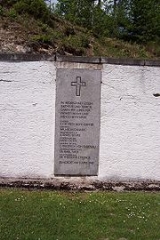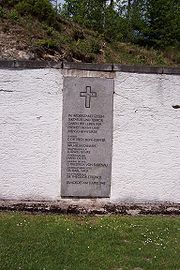
Walter Huppenkothen
Encyclopedia
Walter Huppenkothen was a German
lawyer and Nazi SS
prosecutor.
Huppenkothen attended school in Opladen
and studied Law and Political Science
at the University of Cologne
and University of Düsseldorf and then qualified as a lawyer. On May 1, 1933, he joined the Nazi Party and the Allgemeine SS
. Unable to find employment in government service he joined the SD
(the intelligence service of the SS) in Düsseldorf. After the invasion of Poland he was commander of the Security Police and the SD in Kraków
, then in February 1940 he was posted Lublin
as head of the Gestapo. From July 1941 he was appointed to the Reich Security Main Office in Berlin
with the rank of Sturmbannführer
(Major) in charge of a Gestapo Unit dealing with reactionaries and liberals, as the successor to Walter Schellenberg
. After the dismissal of Wilhelm Canaris
he attended a meeting in March 1944 that established a unified intelligence service.
As an SS Standartenführer
(Colonel) he was appointed the prosecutor of the SS and police court in Munich
. On April 6, 1945, he prosecuted Hans von Dohnanyi
in Sachsenhausen concentration camp
while the defendant lay semi-conscious on a stretcher having contacted a serious infection and the proceedings ended with him being condemned to death by Sturmbannführer
Otto Thorbeck
. On April 8, 1945, under orders from Ernst Kaltenbrunner
On April 8, 1945, under orders from Ernst Kaltenbrunner
, he was the prosecutor at a drumhead court-martial
presided over by Otto Thorbeck without witnesses, records of proceedings or a defence in Flossenbürg concentration camp
. It condemned Dietrich Bonhoeffer
, General Hans Oster
, Army chief judge Dr. Karl Sack
, Captain Ludwig Gehre
and Admiral Wilhelm Canaris
to death. They were all hanged on April 9, two weeks before the United States Army
liberated the camp. Thorbeck later testified that the conspiracy trials lasted three hours under Huppenkothen's direction and that he shouted the accusation at them, then permitted a brief answer period before the death sentence was imposed and the prisoners were executed the following day.
He was captured at Gmunden
on April 26, 1945. After the war Huppenkothen was interned by the Americans and worked for the Counterintelligence Corps of the US Army until 1949. He was tried in West Germany
in the 1950s and sentenced to seven years' imprisonment, but was acquitted of murder. That acquittal was, and remains, controversial.
Germans
The Germans are a Germanic ethnic group native to Central Europe. The English term Germans has referred to the German-speaking population of the Holy Roman Empire since the Late Middle Ages....
lawyer and Nazi SS
Schutzstaffel
The Schutzstaffel |Sig runes]]) was a major paramilitary organization under Adolf Hitler and the Nazi Party. Built upon the Nazi ideology, the SS under Heinrich Himmler's command was responsible for many of the crimes against humanity during World War II...
prosecutor.
Huppenkothen attended school in Opladen
Opladen
Opladen, now a suburb of Leverkusen, used to be the capital of the Rhein-Wupper-Kreis up to 1975. Opladen station is located 10 m. N.E. from Cologne on the railway to Wuppertal. Its is also on the Autobahn A3. Pop. 6338, 42,000. It has an Evangelical and several Roman Catholic churches...
and studied Law and Political Science
Political science
Political Science is a social science discipline concerned with the study of the state, government and politics. Aristotle defined it as the study of the state. It deals extensively with the theory and practice of politics, and the analysis of political systems and political behavior...
at the University of Cologne
University of Cologne
The University of Cologne is one of the oldest universities in Europe and, with over 44,000 students, one of the largest universities in Germany. The university is part of the Deutsche Forschungsgemeinschaft, an association of Germany's leading research universities...
and University of Düsseldorf and then qualified as a lawyer. On May 1, 1933, he joined the Nazi Party and the Allgemeine SS
Allgemeine SS
The Allgemeine SS was the most numerous branch of the Schutzstaffel paramilitary forces of Nazi Germany. It was managed by the SS-Hauptamt...
. Unable to find employment in government service he joined the SD
Sicherheitsdienst
Sicherheitsdienst , full title Sicherheitsdienst des Reichsführers-SS, or SD, was the intelligence agency of the SS and the Nazi Party in Nazi Germany. The organization was the first Nazi Party intelligence organization to be established and was often considered a "sister organization" with the...
(the intelligence service of the SS) in Düsseldorf. After the invasion of Poland he was commander of the Security Police and the SD in Kraków
Kraków
Kraków also Krakow, or Cracow , is the second largest and one of the oldest cities in Poland. Situated on the Vistula River in the Lesser Poland region, the city dates back to the 7th century. Kraków has traditionally been one of the leading centres of Polish academic, cultural, and artistic life...
, then in February 1940 he was posted Lublin
Lublin
Lublin is the ninth largest city in Poland. It is the capital of Lublin Voivodeship with a population of 350,392 . Lublin is also the largest Polish city east of the Vistula river...
as head of the Gestapo. From July 1941 he was appointed to the Reich Security Main Office in Berlin
Berlin
Berlin is the capital city of Germany and is one of the 16 states of Germany. With a population of 3.45 million people, Berlin is Germany's largest city. It is the second most populous city proper and the seventh most populous urban area in the European Union...
with the rank of Sturmbannführer
Sturmbannführer
Sturmbannführer was a paramilitary rank of the Nazi Party equivalent to major, used both in the Sturmabteilung and the Schutzstaffel...
(Major) in charge of a Gestapo Unit dealing with reactionaries and liberals, as the successor to Walter Schellenberg
Walter Schellenberg
Walther Friedrich Schellenberg was a German SS-Brigadeführer who rose through the ranks of the SS to become the head of foreign intelligence following the abolition of the Abwehr in 1944.-Biography:...
. After the dismissal of Wilhelm Canaris
Wilhelm Canaris
Wilhelm Franz Canaris was a German admiral, head of the Abwehr, the German military intelligence service, from 1935 to 1944 and member of the German Resistance.- Early life and World War I :...
he attended a meeting in March 1944 that established a unified intelligence service.
As an SS Standartenführer
Standartenführer
Standartenführer was a Nazi Party paramilitary rank that was used in the so-called Nazi combat-organisations: SA, SS, NSKK and the NSFK...
(Colonel) he was appointed the prosecutor of the SS and police court in Munich
Munich
Munich The city's motto is "" . Before 2006, it was "Weltstadt mit Herz" . Its native name, , is derived from the Old High German Munichen, meaning "by the monks' place". The city's name derives from the monks of the Benedictine order who founded the city; hence the monk depicted on the city's coat...
. On April 6, 1945, he prosecuted Hans von Dohnanyi
Hans von Dohnanyi
Hans von Dohnanyi was a German jurist, rescuer of Jews, and German resistance fighter against the Nazi régime.-Early life:...
in Sachsenhausen concentration camp
Sachsenhausen concentration camp
Sachsenhausen or Sachsenhausen-Oranienburg was a Nazi concentration camp in Oranienburg, Germany, used primarily for political prisoners from 1936 to the end of the Third Reich in May, 1945. After World War II, when Oranienburg was in the Soviet Occupation Zone, the structure was used as an NKVD...
while the defendant lay semi-conscious on a stretcher having contacted a serious infection and the proceedings ended with him being condemned to death by Sturmbannführer
Sturmbannführer
Sturmbannführer was a paramilitary rank of the Nazi Party equivalent to major, used both in the Sturmabteilung and the Schutzstaffel...
Otto Thorbeck
Otto Thorbeck
Dr Otto Thorbeck was a German lawyer and Nazi SS judge.In 1941 Sturmbannführer Thorbeck was appointed the chief judge of the SS and police court in Munich for which SS Standartenführer Walter Huppenkothen was the prosecutor...
.

Ernst Kaltenbrunner
Ernst Kaltenbrunner was an Austrian-born senior official of Nazi Germany during World War II. Between January 1943 and May 1945, he held the offices of Chief of the Reichssicherheitshauptamt , President of Interpol and, as a Obergruppenführer und General der Polizei und Waffen-SS, he was the...
, he was the prosecutor at a drumhead court-martial
Drumhead court-martial
A drumhead court-martial is a court-martial held in the field to hear urgent charges of offences committed in action. The term is said to originate from the use of a drumhead as an improvised writing table, altar for religious services, and a traditional gathering point for a regiment for orders...
presided over by Otto Thorbeck without witnesses, records of proceedings or a defence in Flossenbürg concentration camp
Flossenbürg concentration camp
Konzentrationslager Flossenbürg was a Nazi concentration camp built in May 1938 by the Schutzstaffel Economic-Administrative Main Office at Flossenbürg, in the Oberpfalz region of Bavaria, Germany, near the border with Czechoslovakia. Until its liberation in April 1945, more than 96,000 prisoners...
. It condemned Dietrich Bonhoeffer
Dietrich Bonhoeffer
Dietrich Bonhoeffer was a German Lutheran pastor, theologian and martyr. He was a participant in the German resistance movement against Nazism and a founding member of the Confessing Church. He was involved in plans by members of the Abwehr to assassinate Adolf Hitler...
, General Hans Oster
Hans Oster
Hans Oster was a German Army general, deputy head of the Abwehr under Wilhelm Canaris, and an opponent of Adolf Hitler and Nazism. He was a leading figure of the German resistance from 1938 to 1943.-Early career:...
, Army chief judge Dr. Karl Sack
Karl Sack
Karl Sack was a German jurist and member of the resistance movement during World War II....
, Captain Ludwig Gehre
Ludwig Gehre
Ludwig Gehre was an officer and resistance fighter involved in the preparation of an assassination attempt against Hitler.-Life:...
and Admiral Wilhelm Canaris
Wilhelm Canaris
Wilhelm Franz Canaris was a German admiral, head of the Abwehr, the German military intelligence service, from 1935 to 1944 and member of the German Resistance.- Early life and World War I :...
to death. They were all hanged on April 9, two weeks before the United States Army
United States Army
The United States Army is the main branch of the United States Armed Forces responsible for land-based military operations. It is the largest and oldest established branch of the U.S. military, and is one of seven U.S. uniformed services...
liberated the camp. Thorbeck later testified that the conspiracy trials lasted three hours under Huppenkothen's direction and that he shouted the accusation at them, then permitted a brief answer period before the death sentence was imposed and the prisoners were executed the following day.
He was captured at Gmunden
Gmunden
Gmunden is a town in Upper Austria, Austria in the district of Gmunden. It has 13,202 inhabitants . It is much frequented as a health and summer resort, and has a variety of goat, lake, brine, vegetable and pine-cone baths, a hydropathic establishment, inhalation chambers, whey cure, etc...
on April 26, 1945. After the war Huppenkothen was interned by the Americans and worked for the Counterintelligence Corps of the US Army until 1949. He was tried in West Germany
West Germany
West Germany is the common English, but not official, name for the Federal Republic of Germany or FRG in the period between its creation in May 1949 to German reunification on 3 October 1990....
in the 1950s and sentenced to seven years' imprisonment, but was acquitted of murder. That acquittal was, and remains, controversial.

